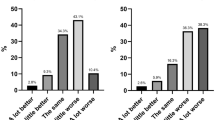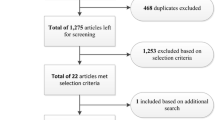Abstract
Purpose
Promoting healthy behaviors may reduce the risk of co-morbidities among childhood and young adult (CYA) cancer survivors. Although behavioral interventions are one way to encourage such activities, there is increasing evidence that health media use—particularly health information seeking—also may influence health knowledge, beliefs, and behaviors. The current study explores patterns of health media use among survivors of CYA cancer. Our focus is on survivors who smoke and thus are at even greater risk of co-morbidities.
Methods
We analyzed data from the Partnership for Health-2 study, a web-based smoking cessation intervention, to examine the prevalence of and factors associated with health media use (N = 329).
Results
Nearly two thirds (65.3 %) of CYA survivors who smoke reported infrequent or no online health information seeking. Many reported never reading health sections of newspapers or general magazines (46.2 %) or watching health segments on local television news (32.3 %). Factors associated with health media use include education and employment, cancer-related distress, and smoking quit attempts.
Conclusions
Health information engagement is low among CYA survivors who smoke, particularly active seeking of health information online. Population subgroups differ in their media use patterns; some of these differences reflect communication inequalities, which have the potential to exacerbate health disparities. Clinicians have an opportunity to guide CYA survivors towards useful and reliable information sources. This guidance could help survivors fulfill their unmet information and support needs and may be particularly important for less educated survivors and other underserved populations.
Similar content being viewed by others
References
American Cancer Society (2012) Cancer facts & figures 2012. American Cancer Society, Atlanta, GA
Oeffinger KC, Mertens AC, Sklar CA, Kawashima T, Hudson MM, Meadows AT, Friedman DL, Marina N, Hobbie W, Kadan-Lottick NS, Schwartz CL, Leisenring W, Robison LL (2006) Chronic health conditions in adult survivors of childhood cancer. N Engl J Med 355(15):1572–1582. doi:10.1056/NEJMsa060185
Geenen MM, Cardous-Ubbink MC, Kremer LC, van den Bos C, van der Pal HJ, Heinen RC, Jaspers MW, Koning CC, Oldenburger F, Langeveld NE, Hart AA, Bakker PJ, Caron HN, van Leeuwen FE (2007) Medical assessment of adverse health outcomes in long-term survivors of childhood cancer. JAMA J Am Med Assoc 297(24):2705–2715. doi:10.1001/jama.297.24.2705
Hewitt M, Weiner SL, Simone JV (eds) (2003) Childhood cancer survivorship: improving care and quality of life. The National Academies Press, Washington, DC
Landier W, Bhatia S, Eshelman DA, Forte KJ, Sweeney T, Hester AL, Darling J, Armstrong FD, Blatt J, Constine LS, Freeman CR, Friedman DL, Green DM, Marina N, Meadows AT, Neglia JP, Oeffinger KC, Robison LL, Ruccione KS, Sklar CA, Hudson MM (2004) Development of risk-based guidelines for pediatric cancer survivors: the Children's Oncology Group Long-Term Follow-Up Guidelines from the Children's Oncology Group Late Effects Committee and Nursing Discipline. J Clin Oncol 22(24):4979–4990. doi:10.1200/jco.2004.11.032
Klosky JL, Howell CR, Li Z, Foster RH, Mertens AC, Robison LL, Ness KK (2012) Risky health behavior among adolescents in the childhood cancer survivor study cohort. J Pediatr Psychol 37(6):634–646. doi:10.1093/jpepsy/jss046
Phillips-Salimi CR, Lommel K, Andrykowski MA (2012) Physical and mental health status and health behaviors of childhood cancer survivors: findings from the 2009 BRFSS survey. Pediatr Blood Cancer 58(6):964–970. doi:10.1002/pbc.23359
Emmons K, Li FP, Whitton J, Mertens AC, Hutchinson R, Diller L, Robison LL (2002) Predictors of smoking initiation and cessation among childhood cancer survivors: a report from the childhood cancer survivor study. J Clin Oncol 20(6):1608–1616
Haupt R, Byrne J, Connelly RR, Mostow EN, Austin DF, Holmes GR, Holmes FF, Latourette HB, Teta MJ, Strong LC et al (1992) Smoking habits in survivors of childhood and adolescent cancer. Med Pediatr Oncol 20(4):301–306
Stolley MR, Restrepo J, Sharp LK (2010) Diet and physical activity in childhood cancer survivors: a review of the literature. Ann Behav Med 39(3):232–249. doi:10.1007/s12160-010-9192-6
Badr H, Paxton RJ, Ater JL, Urbauer D, Demark-Wahnefried W (2011) Health behaviors and weight status of childhood cancer survivors and their parents: similarities and opportunities for joint interventions. J Am Diet Assoc 111(12):1917–1923. doi:10.1016/j.jada.2011.09.004
Emmons KM, Puleo E, Park E, Gritz ER, Butterfield RM, Weeks JC, Mertens A, Li FP (2005) Peer-delivered smoking counseling for childhood cancer survivors increases rate of cessation: the partnership for health study. J Clin Oncol 23(27):6516–6523, doi:JCO.2005.07.04810.1200
Emmons KM, Puleo E, Mertens A, Gritz ER, Diller L, Li FP (2009) Long-term smoking cessation outcomes among childhood cancer survivors in the Partnership for Health Study. J Clin Oncol 27(1):52–60. doi:10.1200/jco.2007.13.0880
Blaauwbroek R, Bouma MJ, Tuinier W, Groenier KH, de Greef MH, Meyboom-de Jong B, Kamps WA, Postma A (2009) The effect of exercise counselling with feedback from a pedometer on fatigue in adult survivors of childhood cancer: a pilot study. Support Care Cancer 17(8):1041–1048. doi:10.1007/s00520-008-0533-y
Viswanath K (2005) Science and society: the communications revolution and cancer control. Nat Rev Cancer 5(10):828–835. doi:10.1038/nrc1718
Kelly B, Hornik R, Romantan A, Schwartz JS, Armstrong K, DeMichele A, Fishbein M, Gray S, Hull S, Kim A, Nagler R, Niederdeppe J, Ramirez AS, Smith-McLallen A, Wong N (2010) Cancer information scanning and seeking in the general population. J Health Commun 15(7):734–753. doi:10.1080/10810730.2010.514029
Shim M, Kelly B, Hornik R (2006) Cancer information scanning and seeking behavior is associated with knowledge, lifestyle choices, and screening. J Health Commun 11(Suppl 1):157–172. doi:10.1080/10810730600637475
Nagler RH, Gray SW, Romantan A, Kelly BJ, DeMichele A, Armstrong K, Schwartz JS, Hornik RC (2010) Differences in information seeking among breast, prostate, and colorectal cancer patients: results from a population-based survey. Patient Educ Couns 81(Suppl):S54–S62. doi:10.1016/j.pec.2010.09.010
Mayer DK, Terrin NC, Kreps GL, Menon U, McCance K, Parsons SK, Mooney KH (2007) Cancer survivors information seeking behaviors: a comparison of survivors who do and do not seek information about cancer. Patient Educ Couns 65(3):342–350. doi:10.1016/j.pec.2006.08.015
Lewis N, Martinez LS, Freres DR, Schwartz JS, Armstrong K, Gray SW, Fraze T, Nagler RH, Bourgoin A, Hornik RC (2012) Seeking cancer-related information from media and family/friends increases fruit and vegetable consumption among cancer patients. Health Commun 27(4):380–388. doi:10.1080/10410236.2011.586990
Viswanath K (2006) Public communications and its role in reducing and eliminating health disparities. In: Thomson GE, Mitchell F, Williams MB (eds) Examining the health disparities research plan of the National Institutes of Health: Unfinished business. National Academies Press, Washington, DC, pp 215–253
Viswanath K, Breen N, Meissner H, Moser RP, Hesse B, Steele WR, Rakowski W (2006) Cancer knowledge and disparities in the information age. J Health Commun 11(Suppl 1):1–17. doi:10.1080/10810730600977517
Galarce EM, Ramanadhan S, Weeks J, Schneider EC, Gray SW, Viswanath K (2011) Class, race, ethnicity and information needs in post-treatment cancer patients. Patient Educ Couns 85(3):432–439. doi:10.1016/j.pec.2011.01.030
Keegan TH, Lichtensztajn DY, Kato I, Kent EE, Wu XC, West MM, Hamilton AS, Zebrack B, Bellizzi KM, Smith AW, Group AHSC (2012) Unmet adolescent and young adult cancer survivors information and service needs: a population-based cancer registry study. J Cancer Surviv 6(3):239–250. doi:10.1007/s11764-012-0219-9
Zebrack B (2008) Information and service needs for young adult cancer patients. Support Care Cancer 16(12):1353–1360. doi:10.1007/s00520-008-0435-z
Dyson GJ, Thompson K, Palmer S, Thomas DM, Schofield P (2012) The relationship between unmet needs and distress amongst young people with cancer. Support Care Cancer 20(1):75–85. doi:10.1007/s00520-010-1059-7
Zebrack B (2009) Information and service needs for young adult cancer survivors. Support Care Cancer 17(4):349–357. doi:10.1007/s00520-008-0469-2
Hall AE, Boyes AW, Bowman J, Walsh RA, James EL, Girgis A (2012) Young adult cancer survivors' psychosocial well-being: a cross-sectional study assessing quality of life, unmet needs, and health behaviors. Support Care Cancer 20(6):1333–1341. doi:10.1007/s00520-011-1221-x
Knijnenburg SL, Kremer LC, van den Bos C, Braam KI, Jaspers MW (2010) Health information needs of childhood cancer survivors and their family. Pediatr Blood Cancer 54(1):123–127. doi:10.1002/pbc.22207
Freyer DR, Mattano LJ (2007) Information and resources for young adults and adolescents with cancer. In: Bleyer WA, Barr RD (eds) Cancer in adolescents and young adults. Springer Verlag, New York, pp 469–487
Stinson JN, White M, Breakey V, Chong AL, Mak I, Low KK, Low AK (2011) Perspectives on quality and content of information on the internet for adolescents with cancer. Pediatr Blood Cancer 57(1):97–104. doi:10.1002/pbc.23068
Oeffinger KC, Hudson MM, Mertens AC, Smith SM, Mitby PA, Eshelman-Kent DA, Ford JS, Jones JK, Kamani S, Robison LL (2011) Increasing rates of breast cancer and cardiac surveillance among high-risk survivors of childhood Hodgkin lymphoma following a mailed, one-page survivorship care plan. Pediatr Blood Cancer 56(5):818–824. doi:10.1002/pbc.22696
Knijnenburg SL, Kremer LC, Versluys AB, Braam KI, Mud MS, van der Pal HJ, Caron HN, Jaspers MW (2013) Evaluation of a patient information website for childhood cancer survivors. Support Care Cancer 21(4):919–926. doi:10.1007/s00520-012-1604-7
de Moor JS, Puleo E, Ford JS, Greenberg M, Hodgson DC, Tyc VL, Ostroff J, Diller LR, Levy AG, Sprunck-Harrild K, Emmons KM (2011) Disseminating a smoking cessation intervention to childhood and young adult cancer survivors: baseline characteristics and study design of the partnership for health-2 study. BMC Cancer 11:165. doi:10.1186/1471-2407-11-165
Emmons MK, Puleo E, Sprunck-Harrild K, Ford J, Ostroff SJ, Hodgson D, Greenberg M, Diller L, de Moor J, Tyc V (2013) Partnership for health-2, a web-based versus print smoking cessation intervention for childhood and young adult cancer survivors: Randomized Comparative Effectiveness Study. J Med Internet Res 15(11):e218
Ware JE Jr, Sherbourne CD (1992) The MOS 36-item short-form health survey (SF-36). I. Conceptual framework and item selection. Med Care 30(6):473–483
Horowitz M, Wilner N, Alvarez W (1979) Impact of event scale: a measure of subjective stress. Psychosom Med 41(3):209–218
Whooley MA, Avins AL, Miranda J, Browner WS (1997) Case-finding instruments for depression. Two questions are as good as many. J Gen Intern Med 12(7):439–445
Nelson DE, Kreps GL, Hesse BW, Croyle RT, Willis G, Arora NK, Rimer BK, Viswanath KV, Weinstein N, Alden S (2004) The Health Information National Trends Survey (HINTS): development, design, and dissemination. J Health Commun 9(5):443–460. doi:10.1080/10810730490504233, discussion 481-444
Nagler RH, Puleo E, Sprunck-Harrild K, Emmons K (2012) Internet use among childhood and young adult cancer survivors who smoke: implications for cessation interventions. Cancer Causes Control 23:647–652. doi:10.1007/s10552-012-9926-9
Hargittai E (2010) Digital Na(t)ives? Variation in Internet skills and uses among members of the “net generation”. Sociol Inq 80(1):92–113. doi:10.1111/j.1475-682X.2009.00317.x
Wakefield CE, Butow P, Fleming CA, Daniel G, Cohn RJ (2012) Family information needs at childhood cancer treatment completion. Pediatr Blood Cancer 58(4):621–626. doi:10.1002/pbc.23316
Nagler RH, Romantan A, Kelly B, Stevens R, Gray S, Hull S, Ramirez A, Hornik R (2010) How do cancer patients navigate the public information environment? Understanding patterns and motivations for movement among information sources. J Cancer Educ 25(3):360–370. doi:10.1007/s13187-010-0054-5
Campo RA, Rowland JH, Irwin ML, Nathan PC, Gritz ER, Kinney AY (2011) Cancer prevention after cancer: changing the paradigm—a report from the American Society of Preventive Oncology. Cancer Epidemiol Biomarkers Prev 20(10):2317–2324. doi:10.1158/1055-9965.epi-11-0728
Barakat LP, Schwartz LA, Szabo MM, Hussey HM, Bunin GR (2012) Factors that contribute to post-treatment follow-up care for survivors of childhood cancer. J Cancer Surviv 6(2):155–162. doi:10.1007/s11764-011-0206-6
Acknowledgments
This research was supported by grants 5 R01-CA106914-05 and K05-CA124415 from the National Cancer Institute. Funding support for R.H.N. was provided through the National Cancer Institute by the Harvard Education Program in Cancer Prevention (5 R25-CA057711). The authors would like to thank Nancy Klockson for her assistance in manuscript preparation, as well as the participating survivorship programs: St. Jude Children’s Research Hospital, Memorial Sloan Kettering Cancer Center, Princess Margaret Hospital, The Hospital for Sick Children, and Dana-Farber Cancer Institute/Partners HealthCare.
Conflict of interest statement
The authors have no financial relationships with the organization that sponsored the research. We have full control of all primary data and agree to allow the journal to review the data if requested.
Author information
Authors and Affiliations
Corresponding author
Rights and permissions
About this article
Cite this article
Nagler, R.H., Puleo, E., Sprunck-Harrild, K. et al. Health media use among childhood and young adult cancer survivors who smoke. Support Care Cancer 22, 2497–2507 (2014). https://doi.org/10.1007/s00520-014-2236-x
Received:
Accepted:
Published:
Issue Date:
DOI: https://doi.org/10.1007/s00520-014-2236-x




